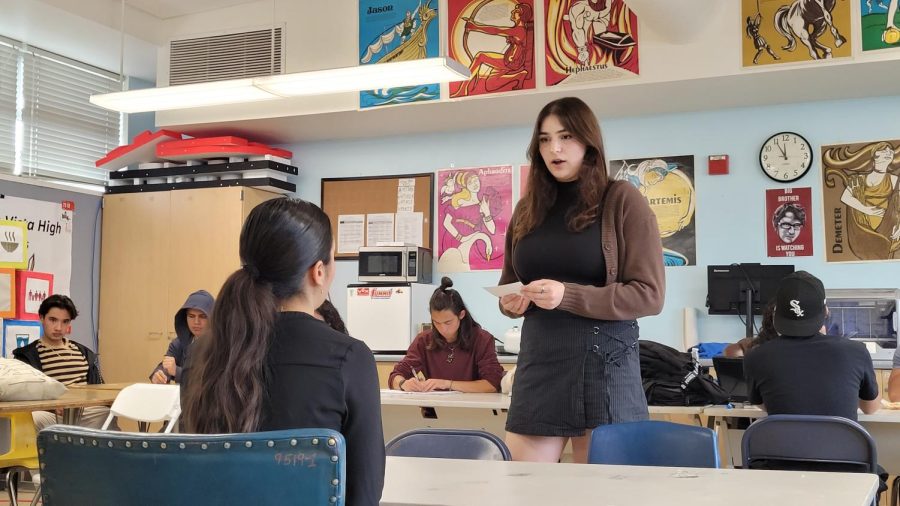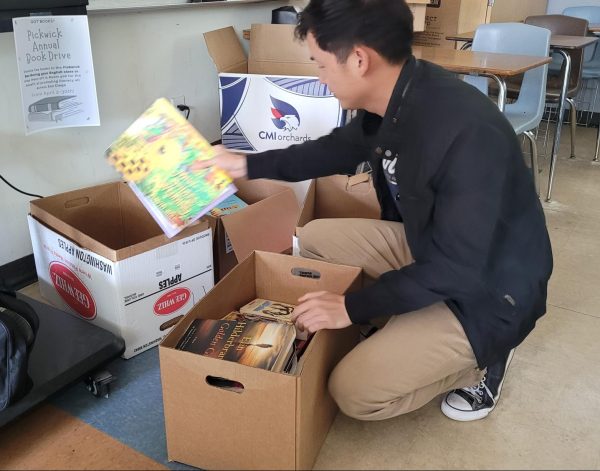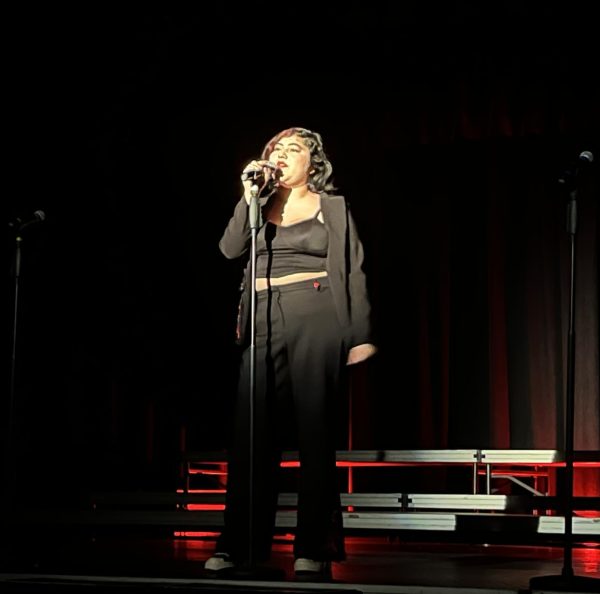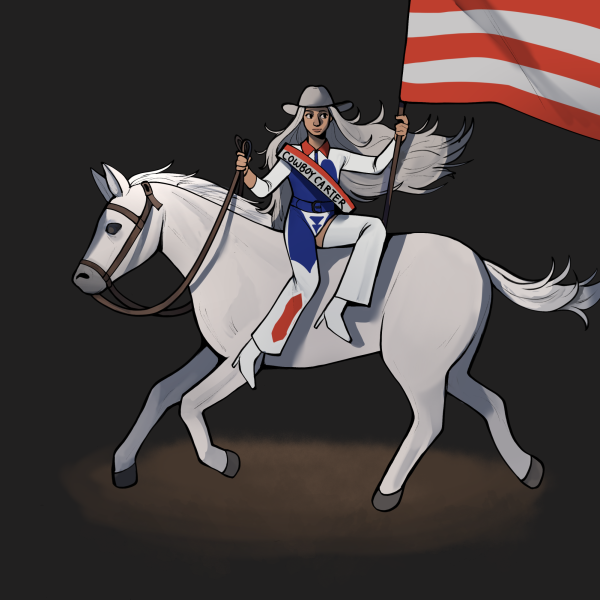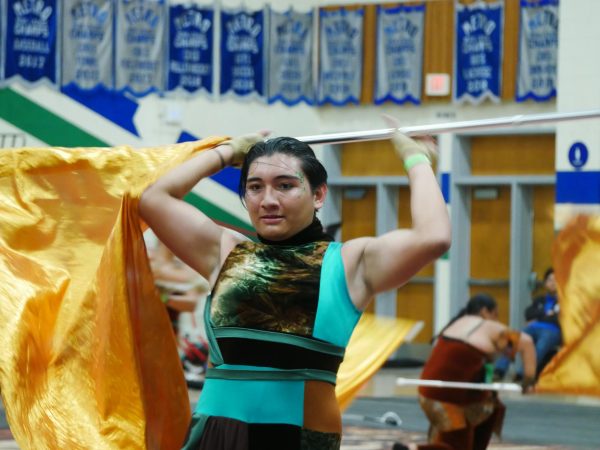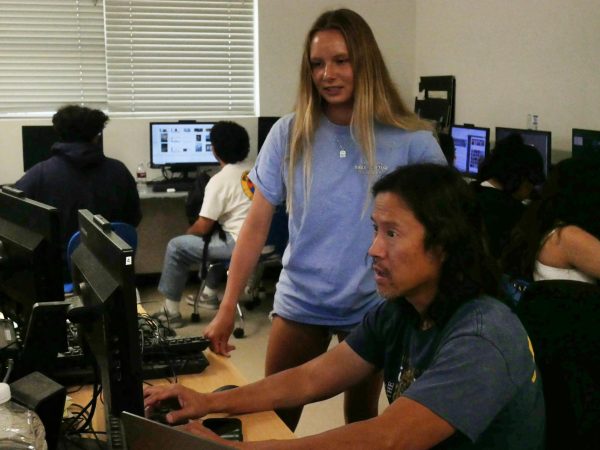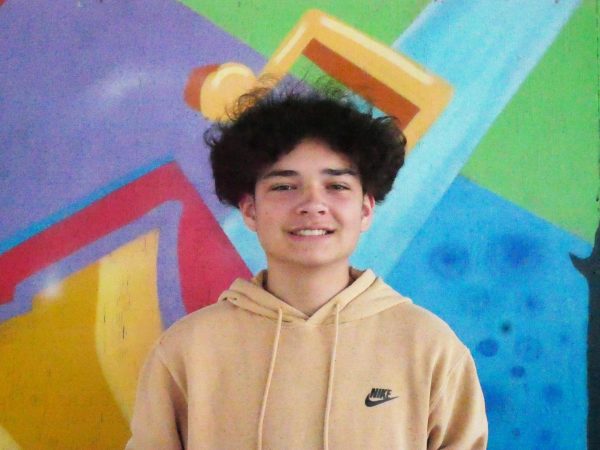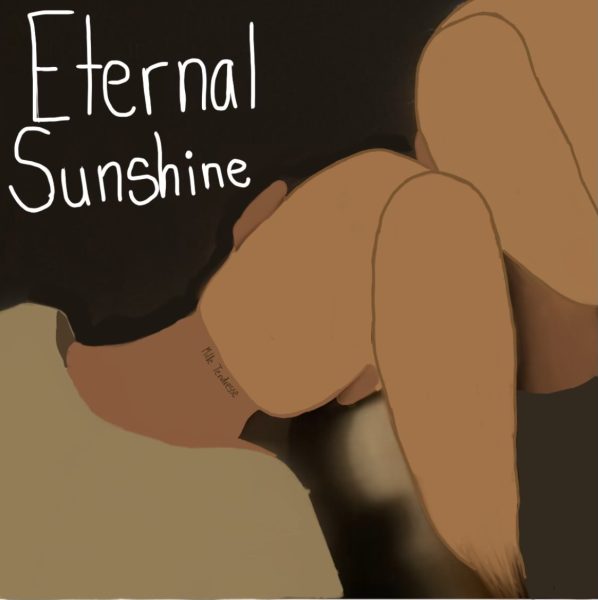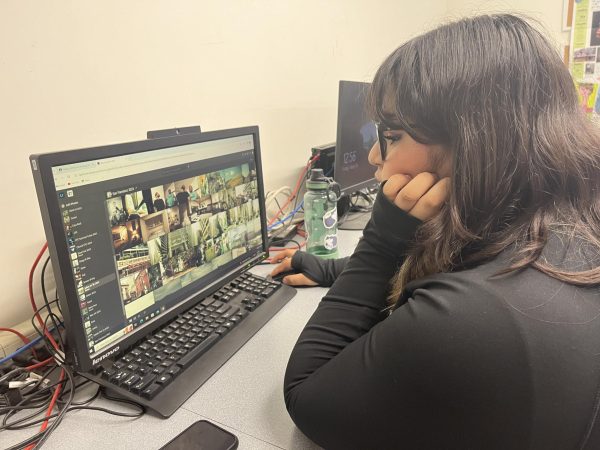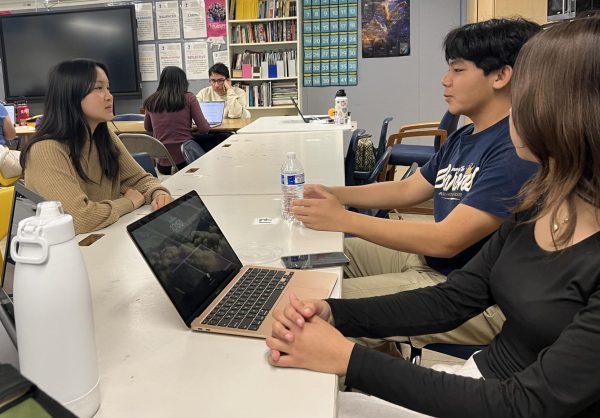Murakami goes on trial
BVH IB Literature HL 1 classes hold a mock trial
Fourth period IB English HL1 student Savannah Jackson as prosecution questions Tonantzin Murillo as Haruki Murakami during the mock trial. The trial covered topics such as misogyny, sexism and Murakami’s place in the IB curriculum.
On May 8 through May 12, Bonita Vista High (BVH) International Baccalaureate (IB) Literature Higher Level (HL) 1 students arrived to class, ready to defend their argument as to whether or not Haruki Murakami’s A Wild Sheep Chase should be removed from the course’s curriculum. After reading A Wild Sheep Chase, the IB Literature HL 1 classes held a mock trial in each class, where students put the book and its author on trial for accounts of misogyny. If the text was deemed guilty of misogyny, it would no longer be read in the IB Literature classes in the years to come.
“In the text we read by Haruki Murakami, A Wild Sheep Chase, there’s a degree of objectification of women and some levels of misogyny that exist,” English 9 Accelerated and IB Literature HL 1 teacher Raymond Chhan said. “The purpose of the mock trial was for students to determine whether or not we should continue reading the book for next year and whether or not the book still has value despite being problematic.”
Upon reading the book, students were assigned roles for the mock trial. Some students served as attorneys for either side—prosecution and defense—and others were witnesses who had to portray characters from the book, the author, or real-life critics of the text. Students then spent weeks preparing a case with opening statements and questions to examine witnesses during the trial. Junior Kaleb Mayorga worked as a defense attorney in the trial, which meant he had to defend the argument that Murakami and his book are not misogynistic. Mayorga explains the work he did preparing for the trial.
“We had to build an entire case, from the opening statement to the closing statement. We also had to determine which witnesses we should bring up and prepare questions for them. During the trial, we’re able to question witnesses and bring more witnesses to the stand to prove our argument,” Mayorga said.
Participating in the mock trial meant that students had to utilize and develop their public speaking skills. This proved challenging when students had to adjust to the unrehearsed answers witnesses in the trial would give. Junior Savannah Jackson, who was a prosecution attorney in the trial, shares that questioning the witnesses was the most challenging part of the mock trial because of having to quickly adapt and alter her questions based on the witnesses’ responses.
“It’s definitely intimidating being put on the spot at that level of public speaking where you’re not really sure what’s going to come at you. The hardest part is trying to maneuver the witnesses’ answers to further support your point.” Jackson said. “You don’t know how the witnesses are going to react. So when you have your questions, you have to alternate the way you’re going to fit with their answers.”
The decision as to whether or not A Wild Sheep Chase will continue to be read in IB Literature classes was determined based on how many classes ruled that the book is misogynistic and should be removed from the class. It was ultimately decided that the IB Literature curriculum will continue to include A Wild Sheep Chase. Three out of the five IB Literature classes decided that Murakami is misogynistic, but the book itself is not guilty of misogyny and does not deserve to be removed from the class. Jackson expresses her disagreement with the verdict.
“I didn’t necessarily agree with the decision. My class even said themselves that they agree that the book was misogynistic, but they wanted to continue reading it so they said not guilty. Murakami himself, within all of his realms of work, is a misogynist. So objectively asking if the book is misogynistic, I would mark it as guilty,” Jackson said.
In contrast, Mayorga agrees that Murakami’s work should remain in the IB Literature curriculum. While Mayorga acknowledges that A Wild Sheep Chase contains misogyny, he does not think the book should be removed.
“I disagree a little bit with them calling Murakami misogynistic. I mean, the book itself does have misogynistic parts in it, but I do agree that we should keep the book in the curriculum because it is an interesting book,” Mayorga said.
This year’s IB Literature mock trial is the second of its kind. Last year, the classes put the short stories by Charlotte Perkins Gilman on trial due to the author’s racist views. Unlike this year’s verdict, it was concluded that Gilman’s work should be removed from the curriculum. IB Literature HL 1 and Theory of Knowledge teacher Jason Good shares that he received positive feedback from students after last year’s trial. He believes that giving students an opportunity to speak about a topic they care about is what makes the experience enjoyable for them.
“Last year was the first year we did the mock trial and a lot of students told me it was one of their favorite things they did all year. I’m not sure what made it their favorite but I like to think that the freedom to talk about something they felt was important was a big takeaway,” Good said. “I think that will be their biggest takeaway this year and I do hope we do it again next year.”
Jackson shares that she found the experience engaging because it gave her an opportunity to speak about misogyny, an issue she feels connected to. She also enjoyed collaborating with her peers in constructing their case for the trial.
“It gave us a way to express our opinions on the book and also misogyny, which is something that I like to denounce. So I feel like this mock trial in particular was especially interesting to me because of that,” Jackson said. “It was a really fun experience getting to work together with the rest of your group, whether you’re on prosecution or defense, making sure that all of you guys feel comfortable in what you’re presenting, and what you’re guiding the class to believe.”
“I felt students did a good job taking a look at the author’s intentions and discussing how some of these misogynistic ideas are being treated,” Good said. “And so I felt like they did a good job, and came to a responsible conclusion.”
By giving students this experience, Chhan hopes they learn to be more comfortable acknowledging the faults of the literature they read. He explains how valuable it is to show students that their opinions about the reading they do in class are heard by their teachers.
“I hope this teaches them to be critical of what they read. I think students are under this belief that whatever their teachers decide for them to read are the best books out there,” Chhan said. “But some authors and some books can be problematic. We want students to be critical of the things they read and let them know that they do have agency and that we do take their decisions in mind.”
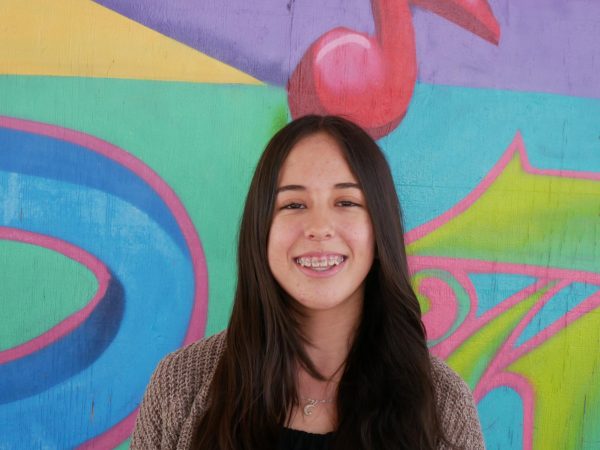
I am a sophmore at Bonita Vista High and this is my second year on staff for the Crusader. This year I am an Arts and Culture Editor and was previously...
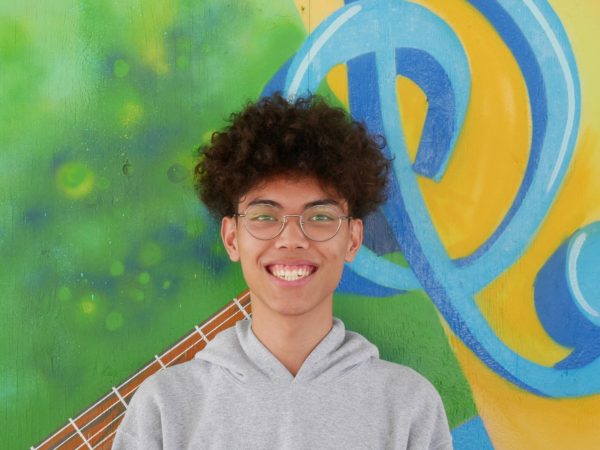
I am currently a senior at Bonita Vista High and this is my second year on staff as a Features Editor. I was previously the Videographer and chose to...

